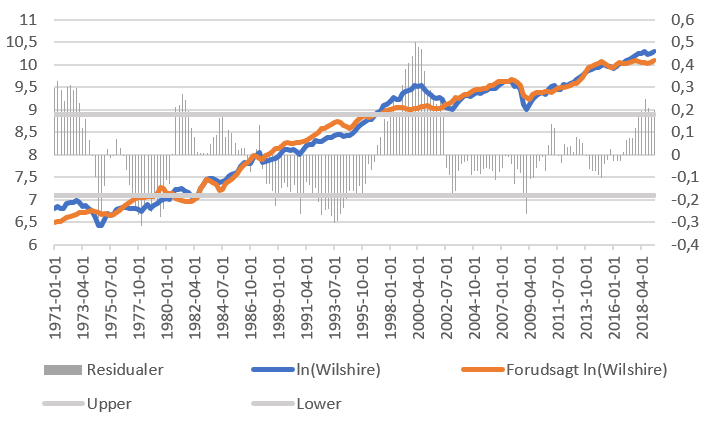If we look at the forecasts we got from epidemiologists initially in this pandemic it has turned out that they have massively wrong. While tragic the number of people who has died in this pandemic has been much lower than forecasted
And Sweden with no lockdown, but with a death told/capita similar to other Western European countries (while larger than in the other Nordic countries).
And the Covid-19 pandemic is not the only pandemic where epidemiologists have been wrong - on the upside.
They were wrong (generally) on HIV/Aids, Ebola, Swine flu, SARS. The death toll never reach the levels predicted and there never was the kind of "super spike" in number that standard epidemiological models seem to predict.
Work done by economists show that this among other things is due to the fact that standard epidemiological models fails to take human behaviour into account.
If there is a pandemic people will react to that - doing the present pandemic people are practicing social distancing and extra hand cleaning without government intervention. We just all want to reduce risk.
However, there likely is a more fundamental problem - economists would call it a Public Choice problem.
Most epidemiologists are government employees - either working for the health authorities or government funded research institutions.
They are generally NOT paid to be right. They are paid if the is a feeling of imminent crisis - and doom. So the incentives is to forecast that.
Furthermore, a government funded epidemiologist will not be rewarded for making a too optimistic forecast, but will likely receive a lot more funding and attention if they are making doomsday forecasts.
I am not claim this is done on purpose, but incentives work - also in research and economists would make the exact same mistakes if they worked in the same 'reward-system'.
However, if we compare epidemiological forecasting to macroeconomic forecasting there is on crucial difference and that is competition.
There is no a few economists making forecasts on the US or Euro zone economies - are a many. That means that forecasts can be compared.
Furthermore, we have the financial markets to tell a story. In February the global equity markets started telling the story that the global economy would take a major hit.
If macroeconomic forecasts had ignored that information then they would have been too optimistic. Similarly now - markets are telling us that the recovery will be quite fast.
That is challenging macroeconomic forecasters making very gloomy forecasts - they have to explain their model assumptions and why they believe markets are wrong.
It is, however, also well-known that government institutions such as Finance Ministries and the IMF make fairly bad forecasts as they often are politicized. For that reason these forecasts are mostly ignored by market participants.
To me it seems like most epidemiological forecast are more similar to economic forecasts made by Finance Ministries - and even worse because Finance Ministries' forecasts will always be compared by the media to independent forecasts.
We don't see this to nearly the same degree in epidemiological forecasting.
So to repeat. 1) epidemiological forecasting is not done in an institutional framework where precision is rewarded enough. 2) There isn't enough competition - there are simply too few epidemiological forecasters.
If covid-19 and other pandemic stay with us and continue to shock major parts of the global economic system going forward then this will change as it will become profitable to do good epidemiological forecasting.
However, at the present good epidemiological forecasting is especially profitable. Alarmist forecast is.
Note that I am not claiming economists make good forecasts or that macroeconomic forecasting isn't of very wrong. It is.
However, macroeconomic forecasting continue to develop and adjust in the market place and being right will yield great economic rewards, which pushes forecasters to do a better job.
However, we have something much better than economists at doing forecasting - and that is markets. Financial markets being the 'wisdom of crowds' is unbiased and generally (weakly) efficient. That means they are a quite good guide for the direction the economy will take.
This is also why I for years have argued that policy makers should make prediction market to make decision and had advocated that monetary policy should be focused on market inflation expectations rather than model-based.
Generally we need prediction markets to help policy makers make the right decision based on unbiased market forecasts.
That mean there would be great public benefit from having 'global warming' markets and a 'pandemic market'
This of course also goes for economic policy - we need prediction markets for unemployment and real and nominal GDP.
Returning to epidemiological forecasting my point is not that 'epidemiologists are bad" and "economists are good". My point is that they operate in different incentive structures.
That said, forecasting economic growth over the coming 2-3 years is something "we" are used and macroeconomic forecasting has been around forever. Each new shock is different, but not completely different. We have a lot of experience in forecasting macroeconomics.
On the other hand forecasting the development in a pandemic means you start from scratch every time. That of course is very different and much harder than observing the same kind of shock over and over again.
But the incentive structures does help. Furthermore, the fact that we have seen a lot of "black box models" during this crisis doesn't help. We need openness and transparency regarding model assumptions. And we need competition rather than 'forecasting monopolies'
This is not a critique of epidemiologists, but a critique of the overall way forecasting is done and mostly how it is used to shape policies and it is a critique very similar to things I have said about economic forecasting for year. /The end.





